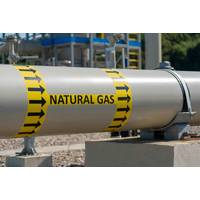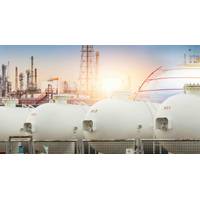Egypt Reaches LNG Import Deal with Hoegh
Government, firm see terminal operational by third quarter. Expert calls timeline ambitious; gas badly need for power generation, industry.
Egypt has secured a means of importing liquefied natural gas (LNG) that will help it address an energy crisis, although the LNG import terminal to be provided by a Norwegian firm will not be in place in time to ease painful gas shortages this summer.
Egypt's oil ministry and Hoegh LNG said on Monday they had reached an agreement for Egypt to use of one of Hoegh's Floating Storage and Regasification Units (FSRU) for five years.
Hoegh Chief Executive Sveinung Stoehle told Reuters the firm had signed a contract including "the main details of the agreement, but there are still some details that need to be worked out."
Egypt can export LNG but cannot import it without the terminal, and a worsening gas shortage has caused power cuts that are set to become more acute during the hot summer months.
The tender process to find a company to provide the terminal began around 20 months ago, well before the army toppled Islamist President Mohamed Mursi last July. It continued to run into hurdles under the interim government that replaced Mursi.
The terminal will not be ready for the summer, when the country's next president will take office and face the challenge of power cuts and fuel shortages - issues that helped spur mass protests against Mursi.
But once the terminal is operational, it will enable Egypt to secure badly needed supplies of gas, needed for power generation for households and industry.
The state-run gas company said last week it had reached deals for 12 shipments of LNG from Russian and French firms, without giving details on pricing arrangements.
Hoegh said the FSRU was set to start operations in the third quarter of this year. The ministry said the terminal would be moored off of the Red Sea port of Ain Sokhna from Sept. 1.
Giles Farrer, senior analyst on Wood Mackenzie's LNG team, said that although it was feasible to have the terminal in place by September, technical issues such as connecting it to the main networks made the timeline "look ambitious."
Farrer said the announcement was an encouraging step, but added specifics of how payment - both for the terminal and for gas imports - would be structured were still unclear.
Despite more than $12 billion in loans, donations, and free fuel aid from Gulf oil producers to Cairo since Mursi's ouster, Egypt's finances are still precarious.
GAS SHORTAGES
Energy problems are likely to worsen in the next fiscal year beginning in July, when consumption will outstrip output for the first time, according to the government.
Gas is in short supply due to declining domestic production, forcing the government to cut into LNG earmarked for export.
Though paying for imported natural gas is less desirable for Egypt than contracting with foreign firms to exploit domestic reserves, violent unrest since the 2011 uprising that ousted autocratic President Hosni Mubarak has hurt investor confidence.
Companies have been wary of developing reserves, and the government's promises to offer more appealing terms to reassure them have not yet resulted in new contracts.
Oil and gas firm BG Group warned earlier this year that turmoil in Egypt would hit its 2014 output. The government owes foreign energy firms including BG at least $5.7 billion, a top state oil executive said last month.
Egypt's energy problems are unlikely to be solved until the government tackles the root cause - a wasteful, decades-old fuel subsidies system that drains foreign currency reserves and keeps consumption unchecked. Mismanagement of the sector has also contributed to the shortages.
Successive governments have failed to develop a sound strategy to tap major natural gas reserves even as an exploding population boosted demand for the fuel. In the absence of investments, the government is prioritising imports.
Oil Minister Sherif Ismail told Reuters in February the government was aiming to get LNG import facilities in operation by the summer but said that if the problem was not addressed this year, it would be "at least for the years to come."
Reuters reported in the same month that Hoegh had pulled out of the deal to install the terminal, citing sources with knowledge of the talks between Cairo and Hoegh.
Hoegh said on Monday the deal was "on good commercial terms" and it was "very pleased," without providing details.
The oil ministry said the platform had a storage capacity of 170,000 cubic metres and was undergoing final testing in South Korea.
By Maggie Fick and Joachim Dagenborg






